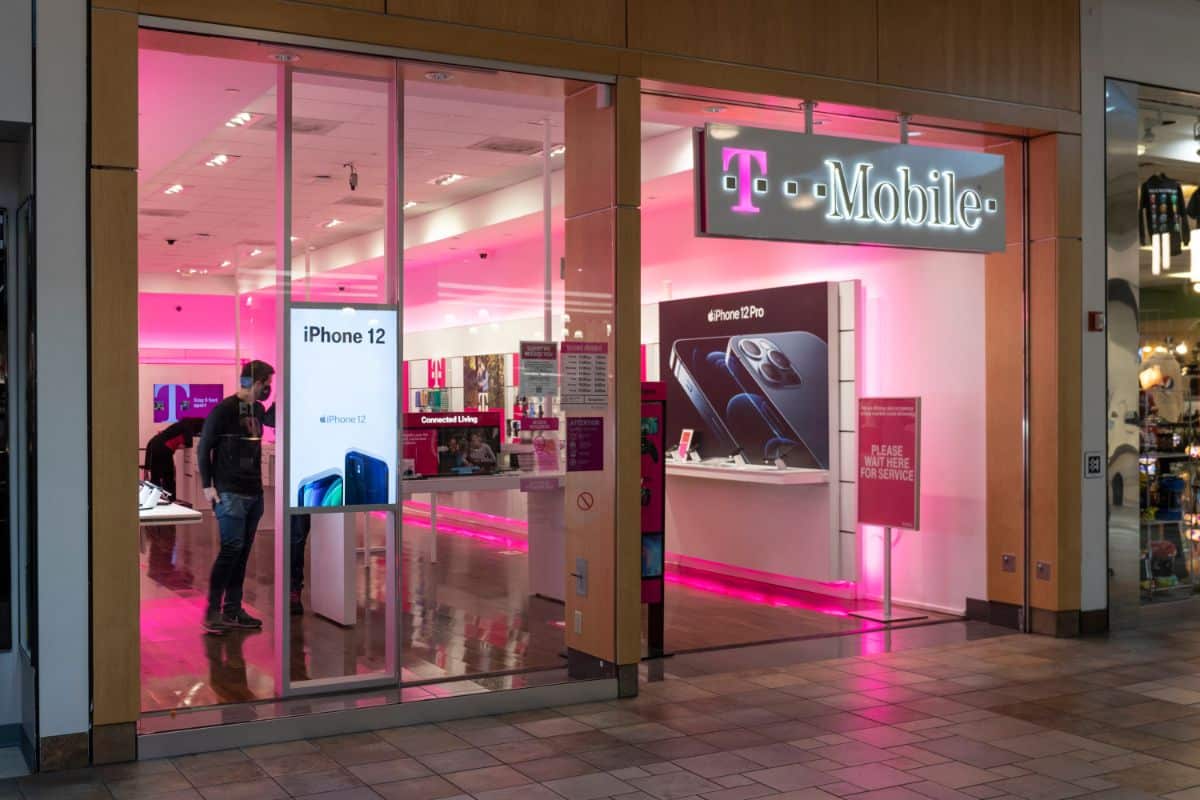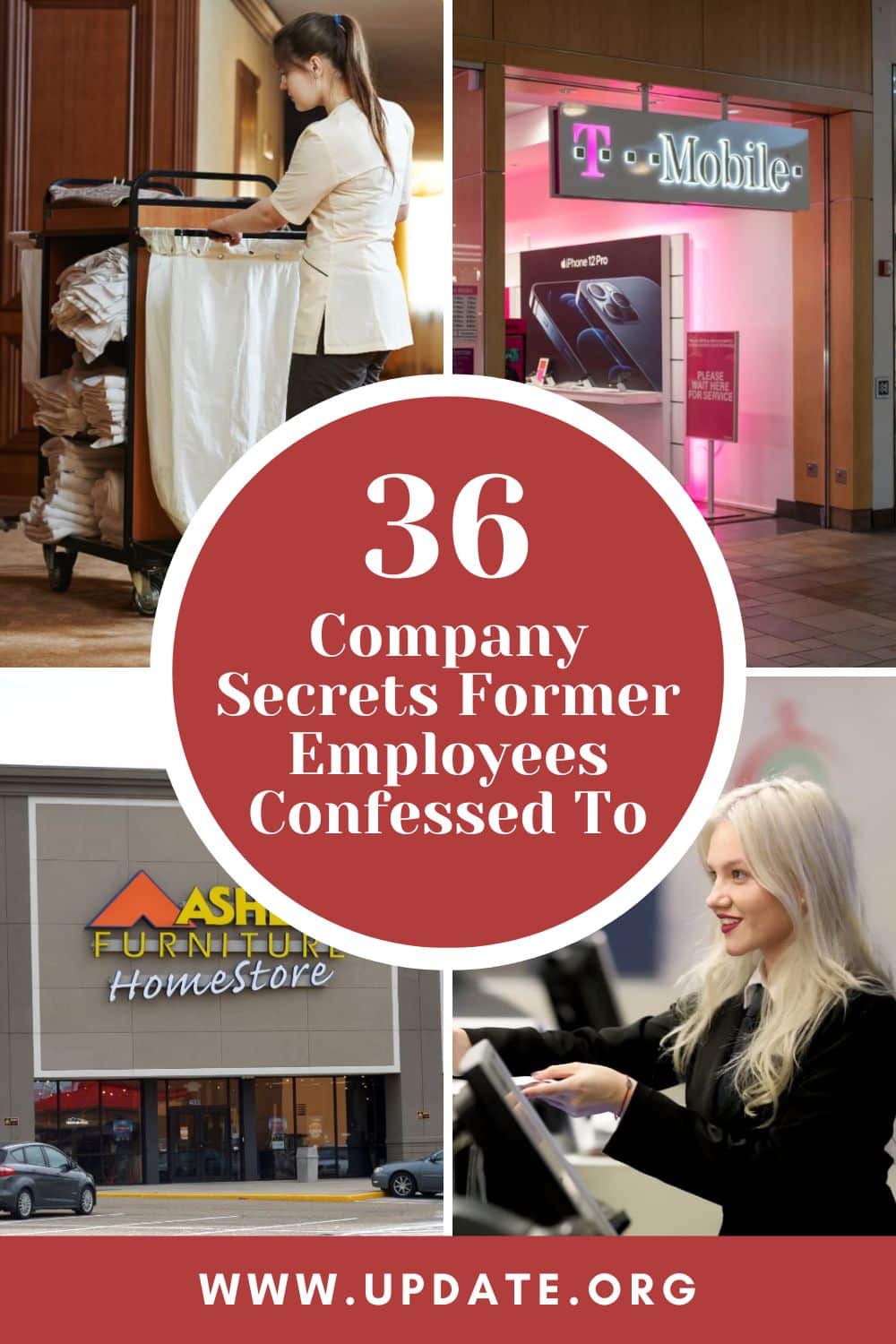Former employees have stepped forward to spill the beans on the secrets their companies hoped to keep under wraps. From clandestine practices in renowned fast-food chains to deceptive strategies in major corporations, this collection of revelations sheds light on the inner workings that companies often keep confidential.

Get ready for an eye-opening journey through the confessions of those who once worked behind the scenes, revealing 36 intriguing company secrets that might make you think twice about your favorite brands.
Jump to:
- 1. The Battle for Coverage: The Challenge of Health Insurance Claims
- 2. Editing Realities: Oprah Winfrey's Post-Production Choices
- 3. Marvin Covington: A Businessman with Heart
- 4. Cosmetic Conundrum: L’Oréal vs. Lancôme
- 5. Unveiling the Disconnect: T-Mobile's Dual Coverage Maps
- 6. VIP Privileges in University Admissions: The Low Threshold for Elite Entrants
- 7. A Fizzy Revelation: Diet Sprite and Sprite Zero - A Name Change Game
- 8. Charitable Strings Attached: The Missionary Agenda of a Mormon Church
- 9. Betrayed Trust: Comic Book Store Owner Exploits Grading Service
- 10. Unseen Tragedies: Hotel Housekeeping's Hidden Realities
- 11. Bridal Dress Shopping Deceptions
- 12. Environmental Concerns at Chillicothe Correctional Institution's Vehicle Modification Shop
- 13. Environmental Disregard at an American Toyota Dealership
- 14. The Reliability Shift: Ford Parts from Mexico vs. Detroit
- 15. Paranormal Panic in Prison: The Ghostly Encounter
- 16. Insider Tips for Savvy Shopping at Retail Stores
- 17. Behind the Scenes at Petco: Animal Policies and Health Concerns
- 18. Gendered Pricing in Hair Products
- 19. Hygiene Practices in Retail Clothing Stores
- 20. Staffing Practices in Hotels
- 21. Unscrupulous Practices in Construction Contracts
- 22. Unappetizing Realities in Candy Bagging Warehouses
- 23. Handle with Caution: Airport Baggage Handling Realities
- 24. Bread Expiration Deception Unveiled at Arby's
- 25. Local Favorite's Homemade Fare Revealed as Commercial Sysco Products
- 26. The Myth of "Silent Hold" in Inbound Call Centers Unveiled
- 27. Best Buy's Appliance Sales Strategy Unveiled
- 28. Label Switching: The Deli Meat Deception
- 29. Dating Websites
- 30. Unveiling the Reality of Ashley Furniture Deliveries
- 31. Sneaky APR Adjustments by Credit Card Companies
- 32. Laundry Detergent Overkill: More Than You Need
- 33. Connectivity Conundrum: A Rural ISP's Dilemma
- 34. Exploitation Unveiled: Misconduct in Government-Funded Refugee Advocacy
- 35. The Duality of Human Response in Disasters: Miracles and Devils
- 36. Unintentional Recipe Improvement at Wendy's Leads to Manager's Downfall
1. The Battle for Coverage: The Challenge of Health Insurance Claims

Navigating the intricacies of health insurance can be a frustrating journey. Often, when you file a claim, it faces denial as insurance providers anticipate many will not contest the decision. Upon escalation, the case enters the realm of a "medical management group," introducing another layer of resistance as they actively argue against fulfilling the claim.
2. Editing Realities: Oprah Winfrey's Post-Production Choices
Even media moguls like Oprah Winfrey are not immune to the pressures of image standards. It came to light that Oprah had her arm "waddles" edited in post-production, showcasing the pervasive influence of societal beauty norms even in the world of powerful and influential figures.
3. Marvin Covington: A Businessman with Heart
Marvin Covington, the owner of a Domino's franchise in Oxford, Ohio, may have appeared stringent about cost-cutting initially, but his motivations ran deeper. Beyond his watchful eye on expenses, Covington surprised his employees with biannual bonuses from his personal savings account, emphasizing the importance of continuous learning.
These bonuses were directly tied to store profit margins, showcasing Covington's commitment to genuine profit sharing. He played favorites when hiring, with all of his managers being former employees and many receiving financial support for their education.
4. Cosmetic Conundrum: L’Oréal vs. Lancôme
In the world of cosmetics, a peculiar similarity arises between products from L’Oréal and Lancôme. Despite their striking resemblance, Lancôme manages to command a price tag of approximately $20 higher than its L’Oréal counterpart. This revelation raises questions about the branding and pricing strategies within the beauty industry, leaving consumers to ponder whether the premium cost is justified by tangible differences or merely the allure of a prestigious name.
5. Unveiling the Disconnect: T-Mobile's Dual Coverage Maps

A curious revelation about T-Mobile's coverage emerges, exposing the existence of two distinct maps. While the map presented to customers highlights extensive coverage, an internal counterpart reveals a stark reality—coverage diminishes by approximately 50%.
6. VIP Privileges in University Admissions: The Low Threshold for Elite Entrants
The admissions criteria at certain universities, even those claiming selectivity, unveil a preferential system for rich donors, athletes, and VIPs. While there are still minimum requirements, they are remarkably easy to attain for these privileged groups. Notably, in institutions like BYU, children of General Church Authorities enjoy similar advantageous admission standards, emphasizing the existence of a tiered entry process.
7. A Fizzy Revelation: Diet Sprite and Sprite Zero - A Name Change Game
Surprisingly, Diet Sprite and Sprite Zero were identical in composition; the recipe underwent no alterations during the transition. The only shift occurred in the branding and design, leaving consumers to realize that the difference between the two beverages was merely a change in name.
8. Charitable Strings Attached: The Missionary Agenda of a Mormon Church
While a Mormon church boasts about its charitable efforts, a closer look reveals a distinct connection to missionary work and proselytizing. In Utah, the church extends aid to Iraqi refugees, providing housing, furniture, and food. However, this generosity comes with a caveat – the recipients find themselves obligated to endure visits from missionaries who relentlessly expound on the Mormon religion. These missionaries, displaying audacity, even broach the subject of baptism with Muslim refugees who have already endured significant upheaval in their lives.
9. Betrayed Trust: Comic Book Store Owner Exploits Grading Service
A comic book store introduced a service allowing customers to pay a premium for their rare comics to be graded by CGC. Several months later, a surge of customers visited to inquire about their comics' status. Upon contacting the owner, he consistently cited distribution issues. However, it later came to light that he had been clandestinely selling customers' graded copies online while attempting to substitute them with less valuable back-issue versions.
10. Unseen Tragedies: Hotel Housekeeping's Hidden Realities

Large hotels deal with suicides, deaths, and other tragic incidents more often than they report. Unless the aftermath was particularly distressing, the cleanup proceeded routinely, leaving subsequent guests unaware of the somber events that had taken place in their rooms.
11. Bridal Dress Shopping Deceptions
A friend employed by a bridal dress company revealed some unsettling practices. The company deliberately brings back the "wrong" dress to coax customers into trying on more expensive options, aiming to prompt them to fall in love and ultimately purchase a pricier wedding dress.
The staff guides customers through upscale sections, encouraging them to explore dresses beyond their budget. Often, they overlook checking stock availability within the requested time frame, leading customers to pay extra for expedited shipping or a more luxurious gown. This predatory approach is concealed by compliments, subtle body shaming, and the challenges of managing underpaid and understaffed stores.
12. Environmental Concerns at Chillicothe Correctional Institution's Vehicle Modification Shop
Allegations have surfaced about the vehicle modification shop at Chillicothe Correctional Institution in Ohio engaging in environmentally harmful practices. It is claimed that the shop disposes of waste coolant from its machine shop into a storm drain directly connected to the Scioto River due to inadequate chemical disposal facilities.
This occurs sporadically, approximately once a year, during slow work periods, when the machine's coolant reservoirs are emptied and replaced. The typical disposal method involves transferring the coolant to a waste tote for safe disposal, a standard practice in non-government machine shops.
13. Environmental Disregard at an American Toyota Dealership
All sorts of hazardous materials were routinely discarded without consideration for environmental impact. From car paint, known for its toxicity, being dumped straight into the dumpster to radiator fluid being poured down the drain, the disregard for proper disposal was evident.
Despite having designated barrels for oil disposal in the service department, there were instances of oil being improperly discarded down the drain. The only salvageable items were old car parts, which were collected, sold to scrap yards, and the proceeds pocketed by the management.
14. The Reliability Shift: Ford Parts from Mexico vs. Detroit
Before 2020, there was a notable reliability difference between Ford parts sourced from Mexico and those from D3p3etroit, at least according to experiences in a Detroit-based automotive setting. Despite customers expressing a preference for repairs using Michigan parts, some persistent issues were secretly resolved by using Mexican parts, which proved to be more effective in resolving certain problems.
15. Paranormal Panic in Prison: The Ghostly Encounter

A decade ago, a prison guard shared an intriguing incident involving facial tracking software installed in surveillance cameras. An inmate assigned the seemingly desirable task of cleaning unused solitary confinement cells panicked and claimed to have encountered a ghost.
In a bid to investigate, ranking officers checked the new cameras, discovering that the security software had detected a face behind the startled inmate when he reported the eerie encounter. While recognizing the potential for mundane explanations, the convergence of the inmate's account and the software's detection led to transferring the inmate without any penalties.
16. Insider Tips for Savvy Shopping at Retail Stores
Did you know that most security cameras are decoys, making theft easier than you might think? For the best deals, keep an eye on clearance items whose prices end at $.03; once marked, the next stop is often the dumpster. Want to have some fun? Dial 676 on a desk phone to page messages on the overhead speakers. When selecting products, opt for those in the front as they are usually newer, while the older items get continuously pushed to the back. Don't overlook 'reduced tag' items, especially larger ones like appliances; ask for a price check, and you might score a better deal than the tag suggests. Time to master the art of strategic shopping!
17. Behind the Scenes at Petco: Animal Policies and Health Concerns
Working at a Petco in Alaska revealed some surprising animal policies. The store only allowed white mice, and a shipment of brown/black mice had to be taken to the vet for euthanasia. Animals, whether fish, mice, or snakes, arrived via UPS delivery in packages, making each day unpredictable.
Despite the challenges, a dedicated shift manager worked diligently to care for sick animals, often staying after hours for their well-being. However, a cautionary note was shared: customers were advised against buying fish from Petco due to a common infection issue known as ICK, causing concerns about the health of the aquatic life sold at the store.
18. Gendered Pricing in Hair Products
During my time as a receptionist at an upscale salon, a new line of products marketed towards men was introduced. Despite these items being essentially the same as the existing products, the men's line was priced at half the cost. Notably, the "men's" shampoo was identical to the one the salon had been selling for years, with the only difference being its black packaging adorned with the word "man."
The owner justified the pricing difference, claiming that men wouldn't want to pay as much for hair products. This practice prompted me to inform female customers that the men's shampoo was the exact same product, available at a significantly lower price.
19. Hygiene Practices in Retail Clothing Stores
In the retail industry, it's surprising for many to learn that all new clothing and items customers try on are not cleaned. After years of working in retail, it's clear that there are no washing machines, disinfectant sprays, or wipes available. The lack of hygiene measures can result in unsettling situations, such as opening boxes of new clothes with white bugs emerging from them.
Instances of customers trying on clothes immediately after a workout or leaving skin flakes behind are not uncommon. The cleanliness of returned items and the conditions in factories also raise concerns. The bottom line: people can be unhygienic, so it's advisable to wash new clothes before wearing them at home.
20. Staffing Practices in Hotels

Hotels generally do not maintain 24/7 staffing for security, maintenance, or housekeeping. After completing the cleaning of all rooms, the entire staff typically departs, leaving only one front desk employee on duty. This practice highlights a common staffing approach in the hotel industry, where certain services are not continuously available during the night.
21. Unscrupulous Practices in Construction Contracts
In a large construction company, sales personnel engaged in deceptive practices by deliberately omitting items from contracts. The motivation behind this strategy was to benefit from incentives tied to subsequent "change orders." This approach raised ethical concerns as it potentially exploited the contractual system for personal gain, highlighting a questionable aspect of business practices within the construction industry.
22. Unappetizing Realities in Candy Bagging Warehouses
In a candy bagging warehouse, reminiscent of the budget-friendly gas station snacks, employees faced less-than-ideal conditions. Working in a sweltering room exceeding 100 degrees Fahrenheit with minimal ventilation, they manually crafted trail mix, enduring sweat dripping into the products.
Adding an unusual twist, a portion of the warehouse doubled as the boss's taxidermy treasure room, emitting unpleasant odors in the summer heat. To address expired expiration dates, an unconventional solution was employed: using nail polish remover to erase the dates.
23. Handle with Caution: Airport Baggage Handling Realities
In the world of airport baggage handling, the truth is stark: nothing is handled with care. Even if marked as fragile, the fate of delicate items lies in the hands of the kindness of baggage handlers. The advice for travelers is straightforward—avoid packing breakable items at all costs to mitigate the risks associated with the less-than-gentle journey through the airport handling process.
24. Bread Expiration Deception Unveiled at Arby's
An Arby's manager was caught replacing expiration stickers on the bread with new ones, presumably to extend the shelf life of the product. The aftermath of this deceptive act was substantial, as over 100 pitas with evident green fuzz had to be discarded by an astute employee who uncovered the manager's questionable maneuver.
25. Local Favorite's Homemade Fare Revealed as Commercial Sysco Products

Despite its reputation as one of the best restaurants in town, a local hotspot has been exposed for not living up to its claim of serving entirely homemade dishes. Particularly, the renowned hot beef sandwiches, touted for their homemade potatoes and gravy, and the popular fish fry, known as the cod platter during the week, have a surprising twist.
Investigation reveals that the "homemade" potatoes and gravy are instant Sysco products, and the cod platter during weekdays consists of frozen breaded Sysco "fish fillets," essentially a blend of assorted fish shaped into a stick.
26. The Myth of "Silent Hold" in Inbound Call Centers Unveiled
Contrary to the common belief in a "silent hold" during customer service calls, there's no such thing. In reality, agents often put callers on mute rather than hold, maintaining the ability to hear the customer while meeting targets for hold time.
This tactic is not aimed at eavesdropping but rather at minimizing hold time metrics. Agents may mute to consult colleagues, alleviate awkward silences during computer delays, or concentrate on resolving issues without interruptions from customers' questions. The decision to mute is driven by efficiency and the desire to handle problems more effectively.
27. Best Buy's Appliance Sales Strategy Unveiled
Best Buy often sells large appliances, including TVs, washer/dryers, laptops, and phones, at cost or even at a loss. Despite their high-ticket nature, these items don't contribute significantly to the company's profits. Instead, Best Buy relies heavily on the sale of accessories to turn a profit. Cables, cases, mounts, bags, installations, and warranties are the real money-makers. Employees are trained to prioritize the sale of high-end accessories, particularly emphasizing products like Monster cables.
28. Label Switching: The Deli Meat Deception
The distinction between high-quality deli meat and standard deli meat found in other grocery stores boils down to a simple label switch. On the production line, a pause is orchestrated, allowing the label machine operator to make the change. Essentially, the meat remains the same; the label undergoes a transformation, creating the illusion of a premium product.
29. Dating Websites
Dating websites don't want you to find love. They're designed to squeeze as much money out of you as possible before you cancel and partly rely on people forgetting to cancel a subscription and putting deliberate barriers in the cancellation process.
30. Unveiling the Reality of Ashley Furniture Deliveries

At Ashley Furniture, the harsh truth is that a significant portion of the delivered furniture undergoes a repair process in the warehouse before reaching the customer. Couches, dressers, and nightstands often suffer damage during offloading, only to be patched up by technicians and presented to customers as "new."
Approximately 85% of the products dispatched for delivery are, in fact, refurbished items. To secure an authentic, untouched piece straight from the manufacturer, opting to pick up furniture directly from the warehouse is the key. Customers are well within their rights to inspect the furniture on the spot, saving both money and the hassle of dealing with potential damages discovered later on.
31. Sneaky APR Adjustments by Credit Card Companies
Credit card companies engage in a subtle but impactful practice by frequently altering customers' Annual Percentage Rates (APRs) without providing explicit notification. Leveraging the loophole that requires them to disclose only three or four decimal points, these companies may tweak an APR from, for instance, 15.99% to 15.994%. While seemingly negligible, this slight adjustment allows them to accrue an extra cent or two per customer each month, resulting in a collective financial gain that can accumulate significantly over time.
32. Laundry Detergent Overkill: More Than You Need
Laundry detergent formulas are intentionally designed to be stronger than necessary. In reality, you only need half a cap for most loads unless they're exceptionally dirty. Some workers, aware of this excess potency, would use the detergent that had leaked on their uniforms without adding any extra when washing them. Despite this, the company officially recommends using a minimum of a full cap for all loads, potentially leading to quicker consumption and increased purchases.
33. Connectivity Conundrum: A Rural ISP's Dilemma
At a rural ISP, we faced a challenging situation with one access point serving 13 customers but only 12 provisioned IP addresses. This meant that at any given time, only 12 out of the 13 customers could be online. To address this, whenever a customer called from that service area, we would log in and reboot the tower's radios, temporarily kicking everyone offline to force DHCP renewals.
While this ensured the caller could get online, it also meant that if all 13 customers wanted to be online simultaneously, we wouldn't be able to accommodate them. Despite raising the issue with management, the cost of resolving the problem was deemed too high, leaving us with a less-than-optimal setup that risked the ISP's reputation.
34. Exploitation Unveiled: Misconduct in Government-Funded Refugee Advocacy
Government-funded refugee advocacy agencies were found to be disproportionately approving young women (18-25) from Syria and Iraq with a history of sexual assault for their services. An investigation revealed that consultants from the agency engaged in sexual relationships with these vulnerable individuals, purposefully denying them employment opportunities to keep them in financial destitution.
As the girls grew desperate, the consultants even made offers of "private prostitution." Whistleblowers, including myself and my team, reported the misconduct to the organization heads. While the consultants were promptly removed after a meeting with senior board members and apologies were issued, within three months, all seven complainants and investigators, including myself, had resigned from the company, each for different reasons. Shockingly, two of the implicated consultants were allowed to resign and are currently working at other agencies with vulnerable young women.
35. The Duality of Human Response in Disasters: Miracles and Devils

In the aftermath of every disaster, two distinct types of individuals emerge: the miracle workers and the devils. The miracle worker, often an unexpected hero from diverse backgrounds like accountants, plumbers, or taxi drivers, displays an extraordinary ability to manage crises successfully. They resourcefully locate necessities in unconventional places, organize people effectively, and save lives with incredible resilience.
On the other side are the devils, individuals seeking personal gain amidst the chaos. They attempt to exploit organizations, divert resources for personal enrichment, and even engage in heinous activities such as kidnapping women and children for sex slavery. These devils intimidate and eliminate legitimate organizers who stand in their way.
36. Unintentional Recipe Improvement at Wendy's Leads to Manager's Downfall
During my time at Wendy's, an interesting incident occurred when we ran out of chicken breading. In a pinch, the manager decided to substitute flour, salt, and pepper for the missing ingredient. Surprisingly, customers began praising the new recipe, finding it even better than the original. However, when the corporation discovered this deviation, they promptly fired the manager, showcasing the unintended consequences of a well-intentioned improvisation.




